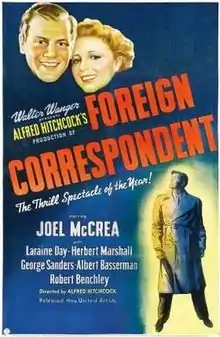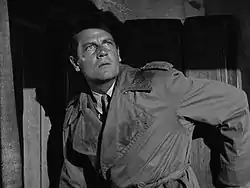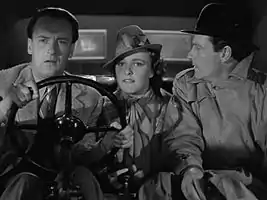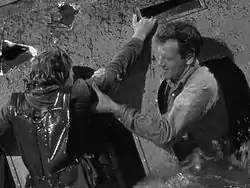Foreign Correspondent (film)
Foreign Correspondent (a.k.a. Imposter and Personal History) is a 1940 American black-and-white spy thriller film directed by Alfred Hitchcock. It tells the story of an American reporter who tries to expose enemy spies in Britain who are involved in a fictional continent-wide conspiracy in the prelude to World War II. It stars Joel McCrea and features 19-year old Laraine Day, Herbert Marshall, George Sanders, Albert Basserman, and Robert Benchley, along with Edmund Gwenn.
| Foreign Correspondent | |
|---|---|
 | |
| Directed by | Alfred Hitchcock |
| Produced by | Walter Wanger |
| Written by |
|
| Screenplay by | |
| Starring | |
| Music by | Alfred Newman |
| Cinematography | Rudolph Maté, A.S.C. |
| Edited by | Dorothy Spencer |
Production company | |
| Distributed by | United Artists |
Release date |
|
Running time | 120 minutes |
| Country | United States |
| Language | English |
| Budget | $1,484,167[1] |
| Box office | $1,598,435[1] |
Foreign Correspondent was Hitchcock's second Hollywood production after leaving the United Kingdom in 1939 (the first was Rebecca) and had an unusually large number of writers: Robert Benchley, Charles Bennett, Harold Clurman, Joan Harrison, Ben Hecht, James Hilton, John Howard Lawson, John Lee Mahin, Richard Maibaum, and Budd Schulberg, with Bennett, Harrison, Hilton and Benchley the only writers credited in the finished film. It was based on Vincent Sheean's political memoir Personal History (1935), the rights to which were purchased by producer Walter Wanger for $10,000.
The film was one of two Hitchcock films nominated for the Academy Award for Best Picture in 1941, the other being Rebecca, which went on to win the award. Foreign Correspondent was nominated for six Academy Awards, including one for Albert Basserman for Best Supporting Actor, but did not win any.
Plot
In mid-August 1939, just before the outbreak of World War II, the editor of the New York Morning Globe, Mr. Powers (Harry Davenport), is concerned about the crisis in Europe, the growing power of Adolf Hitler and Nazi Germany, and the inability of celebrated foreign correspondents to get answers about whether war will ensue. After searching for a good, tough crime reporter for a fresh viewpoint, he appoints John Jones (Joel McCrea) as a foreign correspondent, under the pen name Huntley Haverstock.

Jones sails for England and arrives in London. His first assignment is to interview Stephen Fisher (Herbert Marshall), the leader of the Universal Peace Party, at an event held by Fisher in honor of a Dutch diplomat named Van Meer (Albert Basserman). Unbeknownst to Powers and Jones, Fisher is actually a German agent.
On the way to the party, Jones sees Van Meer entering the car to take him to the party and runs to interview him; Van Meer invites him to ride along, but diplomatically evades his questioning during the trip. At the party, Jones meets Fisher's daughter, Carol (Laraine Day). At first, Johnny rubs Carol the wrong way, but later, they fall in love in Amsterdam.
Van Meer disappears mysteriously. Fisher receives a telegram from Van Meer saying he will not be able to attend the meeting. Fisher informs the guests that Van Meer, who was supposed to be the guest of honor at the event, will not be attending; instead, he will be at a political conference in Amsterdam. Fisher calls upon his daughter Carol to make the keynote speech in place of Van Meer. She fumbles her speech because she is distracted by Johnny, who keeps looking at her and has stuck personal messages among her speech notes.
Powers wires Johnny to rush to Amsterdam to interview Van Meer at his political conference. There, a man who looks like Van Meer is shot in front of a large crowd by a man disguised as a photographer. Jones commandeers a car to follow the assassin's getaway car. The car he jumps into happens to have in it Carol and another reporter, Scott Ffolliott (George Sanders), who explains that the capital letter in his surname was dropped in memory of an executed ancestor. The group follows the assassin to the countryside, where Jones sees a windmill's sail begins turning backward: he concludes that the sail's direction is a signal to a plane flying overhead.
While Carol and Ffolliott go for help, Jones searches the windmill and finds a live Van Meer; the man shot in front of witnesses was an imposter substituted to make everyone believe Van Meer was killed. The old man has been drugged and is unable to tell Jones anything. Jones is forced to flee when the kidnappers become aware of him. They escape with Van Meer in the aircraft before the police arrive.
Later, back at Jones' hotel room in Amsterdam, two spies dressed as police officers arrive to kidnap him. When he suspects who they really are, he escapes out the window and into Carol Fisher's room.
Jones and Carol board a British ship to England, and while a furious storm thunders overhead, he proposes marriage to her, which she accepts. In England, they go to Carol's father's house, where Jones sees Krug (Eduardo Ciannelli), whom he recognizes from the windmill as the operative running the assassination and kidnapping. He informs Fisher, who promises to provide a bodyguard who will protect him. The bodyguard, Rowley (Edmund Gwenn), whose true task is to kill Jones, is working with Fisher and Krug in the plot against Van Meer. At the instant when Rowley tries pushing the reporter off the top of Westminster Cathedral tower, Jones steps aside, and the chatty thug plunges to his death.

Jones and Ffolliott are convinced that Fisher is a traitor, so they come up with a plan: Jones will take Carol to Cambridge, and Ffolliott will pretend she has been kidnapped to force Fisher to divulge Van Meer's location. After a misunderstanding with Jones, Carol returns to London. Just as Fisher is about to fall for Ffolliott's bluff, he hears her car pull up.
Fisher heads to a hotel where Van Meer is being held with Ffolliott on his tail. Van Meer is being interrogated using sleep deprivation to discover a secret clause in a treaty he signed. Just as he is being forced to divulge the information the organization wants, Ffolliott distracts the interrogators. When Jones arrives, Fisher and his bodyguards escape, leaving Van Meer behind. Van Meer is rushed to the hospital in a coma.
Britain and France declare war on Germany. While Jones, Ffolliott, and the Fishers are on a Short S.30 Empire flying boat to America, Fisher confesses his misdeeds to his daughter. Carol believes Jones does not really love her but only used her to pursue her father. Jones protests that he was doing his job as a reporter. Seconds later, the aircraft is shelled by a German destroyer and crashes into the ocean. The survivors perch on the floating wing of the downed aircraft. Realizing that it cannot support everyone, Fisher sacrifices himself by allowing himself to drown. Jones and Ffolliott attempt to save him but are unsuccessful. They are rescued by an American ship, the Mohican. The captain refuses to allow the reporters to file their stories using the ship's communications, citing American neutrality in the war. Still, Jones, Ffolliott, and Carol surreptitiously communicate the story by radio-telephone to Mr. Powers. Later, back in London and now a successful war correspondent, Jones, with Carol at his side, describes London being bombed in a live radio broadcast to the United States, urging Americans to fortify their country and "keep the lights burning" as they go dark in the studio.
Cast
|
|
|
Alfred Hitchcock can be seen when Joel McCrea first spots Van Meer on the street in London; Hitchcock walks past reading a newspaper. Albert Basserman, who plays Van Meer, was German and did not speak English, so he had to learn all his lines phonetically. Likewise, one supposedly Dutch girl in the film speaks Dutch phonetically, though less convincingly.[2]
Production

Producer Walter Wanger bought the rights to journalist Vincent Sheean's memoir Personal History in 1935, but after several adaptations proved unsatisfactory, Wanger allowed the story to stray significantly from the book.[3] It took numerous writers and five years before Wanger had a script he was satisfied with, by which time Hitchcock was in the United States under contract with David O. Selznick and available to direct this film on a loan-out. Hitchcock, who enjoyed not working under the usual close scrutiny of Selznick, originally wanted Gary Cooper and Joan Fontaine for the lead roles, but Cooper was not interested in doing a thriller at the time, and Selznick would not loan out Fontaine. Later, Cooper admitted to Hitchcock that he had made a mistake in turning down the film.[4]
Working titles for the film, which began production on March 18, 1940 and initially finished on June 5, were "Personal History" and "Imposter".[5] Shooting took place at the Samuel Goldwyn Studio in West Hollywood, and on location around Los Angeles and Long Beach.
After the film wrapped, Hitchcock visited his native England, and returned on July 3, to report that it was expected there that the Germans would begin bombing London at any time. To accommodate this, Ben Hecht was called in to write the epilogue of the film, the scene in the radio station, which replaced the original end sequence in which two of the characters discussed the events of the film on a transatlantic seaplane trip. The new ending was filmed on 5 July, presciently foreshadowing the celebrated radio broadcasts of Edward R. Murrow.[2]
Although many critics and film historians claim that neither Germany nor Hitler is named specifically in the film, both the man and the nation are indeed mentioned, including a scene where the name Germany is spelled out in the headline of a newspaper being hawked in the street and, while being given his assignment, Joel McCrea suggests an interview with Hitler, to get his views on the possibility of war. A fictional nation is mentioned numerous times however, possibly indicating that it was briefly considered as a potential proxy aggressor European country rather than an actual Axis nation.[6]

One of the sequences in the film that continues to have a strong effect on viewers is the mid-ocean crash of the flying boat after it is shot down by a German destroyer. In 1972, in an interview with Dick Cavett, Hitchcock discussed some details of how the scene was created. Footage taken from a stunt aircraft diving over the ocean was rear-projected on rice paper in front of the cockpit set, while behind the rice paper were two chutes connected to large water tanks. The chutes were aimed at the windshield of the cockpit so that water would break through the rice paper at the right moment, simulating the crash of the aircraft into the ocean.[6] However, during the crash sequence, studio lights can briefly be seen.
Hitchcock's eccentric marriage proposal to his wife Alma was written for this film, for the scene when Jones proposes to Carol.[6]
Reception
Foreign Correspondent opened on August 16, 1940 in the United States and on October 11 of that year in the United Kingdom. The film, which ends with London being bombed, opened in the United States at the dawn of the Battle of Britain, just three days after the Luftwaffe began bombing British coastal airfields in the early Adlerangriff phase of the Battle of Britain, and a week before Germany began bombing London on August 24.[7]
Box Office
Foreign Correspondent did well at the box office, but its high cost meant it incurred a loss of $369,973.[1] According to Kinematograph Weekly it was the second most popular film of 1940 in Britain (the first being Rebecca).[8]
Critical
It was generally praised by the critics, although some saw it as a glorified B movie.[4] It also attracted attention from at least one professional propagandist, Nazi Propaganda Minister Joseph Goebbels, who called Foreign Correspondent "a masterpiece of propaganda, a first-class production which no doubt will make a certain impression upon the broad masses of the people in enemy countries."[9]
Foreign Correspondent has a 95% "fresh" rating on Rotten Tomatoes.[10]
Awards and honors

In 1941, Foreign Correspondent was nominated for six Academy Awards, but did not win any.
| Award | Category | Nominee(s) | Result | Notes |
|---|---|---|---|---|
| Academy Awards | Best Motion Picture | Walter Wanger | Nominated | [11] |
| Best Supporting Actor | Albert Basserman | Nominated | [11] | |
| Best Original Screenplay | Charles Bennett, Joan Harrison | Nominated | [11] | |
| Best Cinematography | Rudolph Maté | Nominated | [11] | |
| Best Art Direction | Alexander Golitzen | Nominated | [11] | |
| Best Visual Effects | Paul Eagler (photographic), Thomas T. Moulton (sound) | Nominated | [11] | |
| National Board of Review | Best Picture | Nominated | [12] |
Foreign Correspondent was named one of the 10 Best Films of 1940 by Film Daily.[12]
Adaptations
Foreign Correspondent was adapted to the radio program Academy Award Theater on July 24, 1946, with Joseph Cotten starring.[13]
References
- Bernstein 2000, p. 440.
- "Trivia: 'Foreign Correspondent'." Turner Classic Movies. Retrieved: May 23, 2016.
- TCM "Notes: 'Foreign Correspondent'." Turner Classic Movies. Retrieved: May 23, 2016.
- Stafford, Jeff and John M. Miller. "Articles: 'Foreign Correspondent'." Turner Classic Movies. Retrieved: May 23, 2016.
- "Overview: 'Foreign Correspondent'." Turner Classic Movies. Retrieved: May 23, 2016.
- Foreign Correspondent at IMDb
- Legrand and Karney 1995, p. 311.
- Lant, Antonia (1991). Blackout : reinventing women for wartime British cinema. Princeton University Press. p. 231.
- Humphries 1994, p. 66.
- Foreign Correspondent at Rotten Tomatoes
- "Nominees and Winners: The 13th Academy Awards (1941)." oscars.org. Retrieved: May 23, 2016.
- Allmovie "Awards:'Foreign Correspondent'." Allmovies. Retrieved: May 23, 2016.
- "Radio's Golden Age." Nostalgia Digest, Summer 2012, Volume 38, Issue 3, pp. 40–41.
Bibliography
- Bernstein, Matthew. Walter Wanger: Hollywood Independent. Minneapolis, Minnesota: University of Minnesota Press, 2000. ISBN 978-0-8166-3548-1.
- Humphries, Patrick. The Films of Alfred Hitchcock. New York: Crescent Books, 1994. ISBN 978-0-517-10292-3.
- Legrand, Catherine and Robyn Karney. Chronicle of the Cinema. London: Dorling Kindersley, 1995. ISBN 978-0-7894-0123-6.
External links
| Wikiquote has quotations related to: Foreign Correspondent (film) |
| Wikimedia Commons has media related to Foreign Correspondent (film). |
- Foreign Correspondent at IMDb
- Foreign Correspondent at the TCM Movie Database
- Foreign Correspondent at AllMovie
- Foreign Correspondent at the American Film Institute Catalog
- Foreign Correspondent at the Hitchcock Wiki
- Foreign Correspondent at Rotten Tomatoes
- Foreign Correspondent on Academy Award Theater: July 24, 1946
- Foreign Correspondent: The Windmills of War an essay by James Naremore at the Criterion Collection